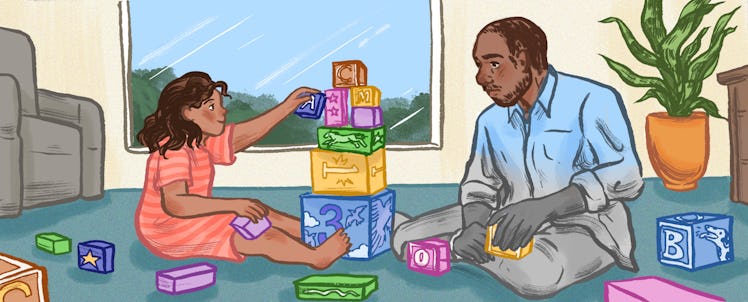Sick and Tired of Caring? You Might Have Compassion Fatigue.
There's burnout. And then there's compassion fatigue.

It’s sometime in the afternoon and your child is mid-meltdown, writhing on the floor demanding a second cookie. Normally, defiant behavior like this, however normal, might be frustrating, or even a bit overwhelming. But lately, you’ve noticed you have a much shorter fuse. Your patience is worn thin, and you can’t seem to muster compassion for your clearly upset toddler. Sure, the COVID-19 plagued world is a mess right now so you may just be stressed or suffering burnout. But if an I-can’t-even attitude plagues you on an ongoing basis, you might be suffering from a phenomenon known as compassion fatigue.
Defined as distress in providing care for another person, compassion fatigue (sometimes called “empathy burnout” or “secondary trauma”) is an overwhelming feeling of simply not caring about others’ needs. It commonly occurs among health care providers. But during a time when a leisurely listen to the news or scroll through social media presents you with one horror after another, compassion fatigue can affect almost anyone. For those in charge of caring for kids, it’s a problem that needs to be recognized and addressed.
So, What is Compassion Fatigue?
Compassion fatigue is a type of distress marked by a sense of apathy toward other people’s suffering, often as a result of ongoing exposure to it. Patricia Smith, founder of the Compassion Fatigue Awareness Project, says people who have experienced vicarious trauma, like health care workers who regularly watch people suffer and die, are more likely to experience distress in caring for others. The higher the vicarious trauma, the more intense the compassion fatigue.
Unlike with burnout or depression, Smith notes that there has to be an element of trauma for a person to experience true compassion fatigue. But given that, during the COVID-19 pandemic, most of us have experienced major life changes and painful losses in the past several months, incidences of trauma probably aren’t too far-fetched.
In identifying compassion fatigue, the first sign to look for, per Smith, is a feeling that you have nothing left to give.
“It can result in numbness, apathy, and isolation — going into your room and shutting the door so people don’t have access to you,” she says.
Along with symptoms of withdrawal, Smith says people with compassion fatigue might be prone to self-medicate with substances. There might also be persistent physical ailments, such as sleep disruptions, headaches, or general pain.
“Your body is basically saying ‘I’m hurting and you need to do something about it,’” she says.
For parents, compassion fatigue can result in the inability to care for family. “If you have compassion fatigue, you don’t want anything more to hit you,” she says. “The problem is, you have to be 100-percent present for those little ones.”
What Compassion Fatigue Looks Like in Parents
Parents with compassion fatigue tend to feel easily exhausted and overwhelmed, which can often lead to short tempers when interacting with kids or other family members — even when it comes to routine tasks like providing meals.
“We’re not even talking about the times of crisis or high emotions from your children,” says Heidi McBain, a Texas-based psychotherapist.
As you might expect, compassion fatigue can negatively impact the people for whom you’re supposed to be caring. There’s a ripple effect because a parent’s inability to extend compassion can leave kids feeling unseen, unheard, and misunderstood.
“Because compassion fatigue takes away a parent’s ability to empathize with their kids and see things from their perspective, it can create a cold and emotionally sterile environment for parents and kids alike, not the warm and caring environment most parents know how to create at home,” says McBain.
The deep sense of burnout that compassion fatigue presents might also extend to your relationship with your partner. For example, McBain says the fatigued parent might need more time to rest, leaving the other parent feeling overburdened. Or, parents might be more emotionally reactive toward one another and argue more than usual.
All of these elements culminate in an overwhelming feeling of just not caring.
“Since you feel like you have nothing left to give, compassion fatigue can show up as a sense of neglect,” Smith says. “But it doesn’t mean you don’t love your children; you’re just being somewhat neglectful of your duties.”
Overcoming Compassion Fatigue
If you’re experiencing compassion fatigue, it’s important to map out when you started to feel this way, and identify the last time you felt like, well, “you.”
“Ask yourself when the symptoms started, and if they’re related to giving so much of yourself without receiving a lot in return or not having time to take care of you,” McBain says.
Then, start prioritizing self-care. Since fatigue is a sign of depletion, it’s crucial to do less of what drains you and more of what feels restorative and nurturing. Smith says plenty of restful sleep, exercise, and nutritious food play a big role in restoring people to homeostasis. To avoid depletion, you might also want to set boundaries in relationships with friends or loved ones who drain you, and try to limit your news intake and time on social media.
If you still don’t feel like yourself after implementing a self-care routine, consider talking to a therapist. “Therapy can be a great place to process what has been going on that caused the fatigue and to help you find the solutions that work best for you,” McBain says.
In the process, try to extend compassion to the person who needs it most: you. You’re not alone in your compassion fatigue symptoms, and what you’re experiencing as a fatigued caregiver is totally normal given the circumstances.
“It’s okay to feel bad about your kids, or to not like them for a little while,” says Smith “Those feelings will eventually go away, and the love and care will return.”